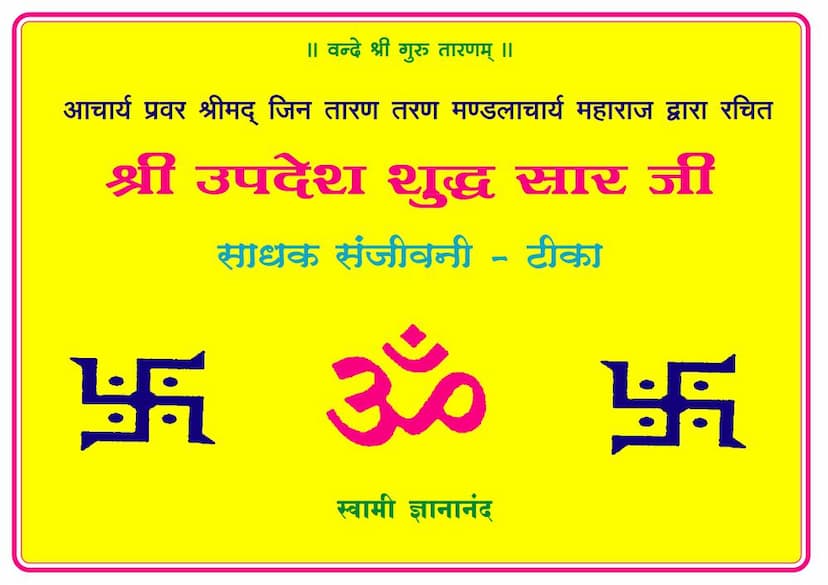Updesh Shuddh Sara
Added to library: September 2, 2025

Summary
Here is a comprehensive summary of the Jain text "Updesh Shuddh Sara" by Gyanand Swami, based on the provided pages:
The book, "Shri Updesh Shuddh Sara," is a discourse on spiritual and self-realization, authored by Acharya Shrimad Jin Taran Taran Mandalacharya Ji Maharaj and elucidated with a commentary called "Sadhak Sanjeevani" by Swami Gyananand Ji Maharaj. The publication is a testament to the efforts of the Tarun Tarun Jain Jagruti Mandal in spreading the teachings of Gurudev Tarun Swami.
Core Theme and Teachings:
The central theme of "Shri Updesh Shuddh Sara" is to guide spiritual seekers towards self-realization and liberation (Moksha). It emphasizes the path of pure spiritual practice and the attainment of the true nature of the soul. The text highlights that the soul is inherently pure and divine, akin to the Tirthankara Bhagvants and the Siddha Parmatma. The primary obstacles on this path are considered to be worldly attachments, desires, and the resulting karmic bonds, which are born from ignorance and the misconception of the self as the body and external possessions.
Key Concepts Elaborated:
-
The True Nature of the Soul: The soul is described as pure, blissful, eternal, and inherently possessing infinite knowledge and perception. It is distinct from the physical body, senses, mind, and all external objects and experiences. The ultimate goal is to realize this inherent, untainted nature.
-
The Path of Self-Realization: The text stresses that true liberation comes from within, through self-knowledge and the experience of the soul's true nature. This is achieved by turning inward, away from external distractions and sensory indulgences.
-
Obstacles on the Path:
- Indriyas (Senses): The senses are identified as powerful agents that lead the soul astray from its true nature, binding it to worldly pleasures and pains. Particular emphasis is placed on the Tongue (Rasna) and its dual role in tasting and speaking, as well as the general allure of sensory experiences.
- Man (Mind): The mind, with its constant fluctuations, desires, and thoughts (vikalps), is a significant obstacle. It is described as restless and easily swayed by external stimuli and internal conditioning.
- Maya (Illusion): The illusion of self in the body, possessions, and worldly relationships is a root cause of suffering and bondage.
- Kashayas (Passions): Anger, pride, delusion, and greed are highlighted as major impediments that obscure the soul's purity and lead to karmic entanglement.
- Rajas and Tamas: These qualities (modes of nature) are seen as contributing to the soul's obscurity and involvement in the material world.
-
Overcoming Obstacles: The text provides guidance on overcoming these obstacles:
- Vivek (Discernment): The ability to differentiate between the eternal soul and the transient body and worldly phenomena is crucial. This discernment helps in detaching from the illusory.
- Drishti (Perspective): Shifting one's perspective from the external and the transient (Paryay) to the internal and the eternal (Swabhav) is paramount.
- Abhyas (Practice): Continuous practice of turning the mind inward, focusing on the soul's true nature, is essential for purification and liberation.
- Sadhana (Spiritual Practice): This includes introspection, meditation, controlling the senses and the mind, and following the teachings of the Tirthankaras and the gurus.
- Tyag (Renunciation): Renunciation of sense objects and worldly desires is necessary to weaken the hold of karmas.
- Samyak Darshan, Gyan, Charitra: The attainment of Right Faith, Right Knowledge, and Right Conduct is the core of spiritual practice and the path to liberation.
- Nishkam Seva: selfless service and devotion to the Tirthankaras and revered gurus are encouraged.
- Vairagya (Detachment): Cultivating detachment from worldly pleasures and pains is vital.
-
The Role of Gurudev Taran Swami: The commentary emphasizes the profound contribution of Acharya Jin Taran Taran Swami, who, through his lived experience and divine knowledge, paved the way for countless souls. He is revered as a spiritual luminary who transcended worldly limitations and guided millions towards self-realization, irrespective of caste or creed. His fourteen texts, including "Shri Updesh Shuddh Sara," are considered illuminating guides for spiritual aspirants.
-
The Commentary (Sadhak Sanjeevani): The commentary by Gyananand Swami is praised for its ability to reveal the profound essence of Gurudev Tarun Swami's teachings in simple language, making the spiritual path accessible. The text acknowledges the efforts of the Tarun Tarun Adhyatm Prachar Yojana Kendra in Bhopal for propagating this literature.
-
Obstacles to Knowledge: The text touches upon how external influences like the "Jan Ranjan Swabhav" (desire to please others), "Coloranjan Dosh" (attachment to the body and its comforts), and "Manoranjan Garav" (pride and ego) act as barriers to true self-knowledge. It explains how these passions lead to ignorance and karmic entanglement, ultimately causing suffering and rebirth.
-
The Goal - Liberation: The ultimate aim presented is to transcend the cycle of birth and death, to shed all karmic impurities, and to attain the pure, liberated state of the soul, which is described as a state of eternal bliss, peace, and omniscience, akin to the Siddha Parmatma.
Structure and Presentation:
The book is structured into various sections (Adhikars) and elaborates on the concepts through verses (Gathas) of the original work, followed by detailed explanations and interpretations. The commentary by Swami Gyananand Ji Maharaj serves as a guiding light, explaining the deeper meanings and practical applications of these spiritual principles. The editorial and publisher's notes highlight the importance of the work, the lineage of gurus, and the collective effort in bringing this spiritual literature to the public.
In essence, "Shri Updesh Shuddh Sara" with its "Sadhak Sanjeevani" commentary is a profound spiritual guide that seeks to lead the reader towards the realization of their pure, eternal soul, the ultimate goal of Jain spiritual pursuit. It acts as a "Sadhak Sanjeevani" (life-giving commentary for the seeker) by offering detailed guidance on overcoming obstacles and achieving spiritual liberation.